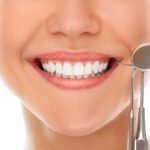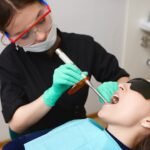Table of Contents
Gum Disease Prevention: Regular checkups allow for the timely detection and prevention of gum diseases such as gingivitis and periodontitis.
Regular checkups at the dentist play a crucial role in preventing and detecting gum diseases such as gingivitis and periodontitis. These conditions, if left untreated, can lead to serious oral health issues and even tooth loss. During a dental checkup, the dentist will thoroughly examine your gums, looking for signs of inflammation, redness, swelling, or bleeding. Additionally, they will measure the depth of gum pockets, as deeper pockets indicate the presence of gum disease.
Early detection of gum diseases is crucial as it allows for timely intervention and prevention. If gingivitis is identified, the dentist can provide professional cleaning and guidance on effective oral hygiene practices to reverse the condition. Moreover, if periodontitis is detected, the dentist can initiate appropriate treatment and develop a personalized plan to manage and control the disease, preventing further progression and damage to the gums and supporting structures. Regular dental checkups, combined with proper at-home oral care, can help maintain healthy gums and overall oral health.

Oral Cancer Screening: Dental visits usually include oral cancer screenings, which can lead to early detection and improved chances of successful treatment.
Oral Cancer Screening: Dental visits usually include oral cancer screenings, an essential component of preventive dental care. These screenings involve a thorough examination of the mouth, gums, and throat to detect any signs or symptoms of oral cancer at an early stage. Early detection plays a significant role in improving the chances of successful treatment and reducing potential complications.
During an oral cancer screening, your dentist will examine your oral tissues for abnormal growths, lesions, or other indicators of potential cancerous cells. They may also feel for any lumps or irregularities in the neck and jaw area. Additionally, specialized tools, such as lights and dye solutions, may be used to enhance the examination and aid in identifying any suspicious areas that require further investigation.
| Aspect | Information |
|---|---|
| Purpose | Oral cancer screenings are conducted during dental visits to detect any signs of oral cancer at an early stage. |
| Procedure | Dentists visually examine the oral cavity, including the lips, gums, tongue, and the inside of the cheeks, for any abnormalities or suspicious lesions. |
| Risk Factors | Smoking, chewing tobacco, excessive alcohol consumption, family history of oral cancer, prolonged sun exposure to the lips, and human papillomavirus (HPV) infection. |
| Importance of Screening | Early detection through screening can lead to timely treatment, improving the chances of successful outcomes and reducing the risk of complications. |
| Frequency of Screening | The American Dental Association recommends oral cancer screenings at least once a year for adults, especially those with risk factors. |
| Additional Tests | In some cases, dentists may use adjunctive screening devices such as VELscope or ViziLite to aid in the detection of oral abnormalities. |
| Patient Education | Dentists educate patients about the importance of regular screenings and encourage them to report any unusual symptoms or changes in their oral health. |
| Follow-up and Referral | If suspicious lesions are detected, patients may be referred to an oral surgeon or oncologist for further evaluation and possible biopsy. |
| Lifestyle Modifications | Patients are advised to maintain a healthy lifestyle, quit smoking or tobacco use, limit alcohol consumption, and practice good oral hygiene to reduce the risk of oral cancer. |
| Support and Counseling | Dentists provide support and counseling to patients diagnosed with oral cancer, guiding them through treatment options and offering emotional support. |
By regularly undergoing oral cancer screenings as part of your dental visits, you are taking a proactive approach to your oral health. Detecting oral cancer early allows for prompt treatment, which can significantly increase the chances of a successful outcome. So, next time you visit your dentist, be sure to discuss the importance of including oral cancer screenings as part of your regular dental care routine.
Personalized Oral Hygiene Advice: Dentists provide valuable guidance on proper oral hygiene practices tailored to individual needs, helping to prevent oral health issues.
Maintaining proper oral hygiene practices is essential for preventing oral health issues and promoting overall dental well-being. Dentists play a crucial role in providing invaluable guidance tailored to individual needs, ensuring optimal oral health for their patients.
Professional dental care starts with personalized oral hygiene advice from dentists who thoroughly evaluate each patient’s oral health condition. They take into account factors such as age, medical history, and specific dental concerns to develop a tailored oral hygiene plan. Through comprehensive consultations, dentists educate patients on the best practices for brushing, flossing, and using mouthwash, taking into consideration their unique circumstances.
Beyond simply instructing patients on proper oral hygiene practices, dentists also provide insights into preventative measures to mitigate potential oral health issues. By recommending specific dental products, such as toothbrushes, toothpaste, and dental floss, dentists ensure that patients are using the most effective tools for their oral care routine. Furthermore, dentists may suggest dietary adjustments and lifestyle changes that can contribute to maintaining optimal oral health.

By availing of personalized oral hygiene advice from dentists, individuals can significantly reduce their risk of developing dental problems. Regular and conscientious dental care, combined with the guidance of a dental professional, empowers patients to take control of their oral health and maintain a healthy smile for years to come.
Tartar and Plaque Removal: Regular dental cleanings ensure the removal of tartar and plaque buildup, which are major contributors to dental problems.
Regular dental cleanings play a crucial role in maintaining optimal oral health by effectively removing tartar and plaque buildup. Tartar and plaque are major contributors to dental problems such as cavities, gum disease, and bad breath. Despite regular brushing and flossing, certain areas in the mouth can be difficult to clean thoroughly, leading to the accumulation of these harmful substances.
During a dental cleaning, a dental hygienist uses specialized tools to gently remove tartar and plaque from the teeth and along the gumline. This process is known as scaling and root planing. By removing these deposits, dental cleanings help to prevent the progression of gum disease and reduce the risk of tooth decay. Additionally, removing tartar and plaque helps to maintain fresh breath, as these substances can harbor bacteria that contribute to bad breath.
In addition to the physical removal of tartar and plaque, dental cleanings also provide an opportunity for dentists to examine the oral cavity for any signs of potential dental issues. Early detection of problems such as cavities or gum disease allows for timely intervention and prevention of further damage. By scheduling regular dental cleanings, individuals can proactively protect their oral health and address any concerns before they escalate into more serious conditions.
Maintaining Fresh Breath: Dental visits help to address bad breath by identifying and treating underlying causes such as gum disease or poor oral hygiene.
Maintaining fresh breath is not only important for personal hygiene but also for social interactions. Dental visits play a crucial role in addressing bad breath by identifying and treating the underlying causes, such as gum disease or poor oral hygiene.
Gum disease, also known as periodontal disease, is a leading cause of bad breath. When bacteria accumulate around the gum line, it can result in inflammation and infection, leading to unpleasant odors. Regular dental checkups allow dentists to detect gum disease in its early stages and provide appropriate treatment to prevent further complications. This can significantly improve not only your oral health but also your breath freshness.

Furthermore, poor oral hygiene practices can contribute to bad breath. Inadequate brushing and flossing allow food particles and bacteria to linger in the mouth, leading to foul odors. During dental visits, dentists can offer personalized oral hygiene advice tailored to your individual needs. They can guide you on proper brushing and flossing techniques, recommend suitable oral care products, and address any concerns or questions you may have about maintaining fresh breath.
In conclusion, dental visits are essential for maintaining fresh breath as they allow for the identification and treatment of underlying causes such as gum disease or poor oral hygiene practices. By addressing these issues, dentists can help improve your oral health and enhance your overall quality of life.
Enhancing Appearance: Dentists can provide cosmetic
Dentistry has come a long way in not only addressing oral health issues but also enhancing the appearance of teeth and smiles. With the advancements in cosmetic dentistry, dentists now have the tools and techniques to transform smiles and boost overall self-confidence. From teeth whitening to veneers and dental implants, there are various options available to achieve the desired aesthetic results.
One of the most popular cosmetic treatments is teeth whitening. Over time, our teeth can become stained or discolored due to factors such as food and drinks, smoking, or certain medications. Luckily, dentists can offer professional teeth whitening procedures that effectively remove stains and restore the natural brightness of teeth. This simple yet effective treatment can instantly enhance the appearance of your smile, giving you a more youthful and radiant look.
Another common cosmetic dental procedure is the application of veneers. Veneers are thin, custom-made shells that are bonded to the front surface of teeth to improve their appearance. They can be used to correct various issues, including discoloration, gaps, chips, and misalignments. Veneers are not only a long-lasting solution but also provide a natural-looking result, making them a popular choice for enhancing smiles.
In addition to teeth whitening and veneers, dental implants are a remarkable option for restoring missing teeth and improving the overall appearance of the smile. Dental implants are artificial tooth roots that are implanted into the jawbone, providing a strong and stable foundation for replacement teeth. They not only look and feel like natural teeth but also help prevent bone loss and maintain the integrity of the facial structure.
Cosmetic dentistry has revolutionized the way we perceive our smiles and offers endless possibilities for enhancing appearance. With the expertise and artistry of dentists, individuals can achieve the smile of their dreams and boost their self-esteem. Whether it’s through teeth whitening, veneers, or dental implants, cosmetic dentistry provides solutions that go beyond oral health and empower individuals to confidently flaunt their beautiful smiles.
How often should I visit the dentist for checkups?
It is recommended to visit the dentist for regular checkups every six months to maintain good oral health.
Can gum diseases like gingivitis and periodontitis be prevented?
Yes, regular checkups with your dentist allow for timely detection and prevention of gum diseases, such as gingivitis and periodontitis.
Are oral cancer screenings included in dental visits?
Yes, dental visits usually include oral cancer screenings, which can lead to early detection and improved chances of successful treatment.
How can dentists help with personalizing oral hygiene practices?
Dentists provide valuable guidance on proper oral hygiene practices tailored to individual needs, helping to prevent oral health issues.
What are the major contributors to dental problems?
Tartar and plaque buildup are major contributors to dental problems, but regular dental cleanings ensure their removal.
Can bad breath be addressed during dental visits?
Yes, dental visits help to address bad breath by identifying and treating underlying causes such as gum disease or poor oral hygiene.
What are some cosmetic procedures that dentists can provide?
Dentists can provide cosmetic procedures such as teeth whitening, porcelain veneers, dental bonding, and orthodontic treatments to enhance appearance.




